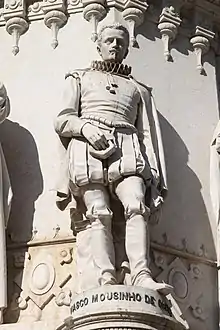Vasco Mouzinho de Quevedo
Vasco Mouzinho de Quevedo (c. 1570-c. 1619) was a Portuguese poet, appreciated for his epic poems.

Biography
Although Vasco Mouzinho de Quevedo e Castelo Branco is regarded as one of greatest Portuguese poets, very little is known about his personal life. He was born around 1570 and died around 1619.[1] He studied law at the University of Coimbra.[2] He wrote both lyrical poetry and epic poems.[3]
Works
Vasco Mouzinho de Quevedo wrote some short poems, for example sonnets,[4] but is known for long poems. He is regarded as an important successor of Luis de Camões.[5][6][7] His first big work is Discurso sobre a Vida e Morte de Santa Isabel Rainha de Portugal[8] which was published in Lisbon 1596 under the title Discurso sobre a Vida e Morte de Santa Isabel Rainha de Portugal e Outras Várias Rimas.[9] The work that is always connected with the name of Vasco Mouzinho de Quevedo is a long epic poem Afonso Africano that was published in 1611. It narrates about Portuguese military expedition to Morocco led by king Afonso V who was later called the African for his great deeds. This war was seen and described as a modern crusade.[10]
Both mentioned poems are written in ottava rima, a stanza of eight lines with rhyme scheme abababcc[11] (in Portuguese oitava-rima).[12]
References
- Lopes), Mike (Aka Sérgio. "DocbWeb® - Pesquisa".
- http://alfarrabio.di.uminho.pt/vercial/quevedo.htm Vasco Mouzinho de Quevedo e Castelo Branco at Projecto Vercial.
- Cristina Azevedo Tavares, A escultura do Chiado da Lisboa romântica à Lisboa dos nossos dias.
- Cardoso, Nuno Catharino (1 January 1918). "Sonetistas portugueses e luso-brasileiros; antologia contendo dados biográficos e bibliográficos ácêrca de cento e oitenta e nove poetas. 1495 á novissima geração". Lisboa Edição e Propriedade do Auctor – via Internet Archive.
- Regina Zilberman, O Ano da Morte de Ricardo Reis - História e não-História.
- Cushman, Stephen; Cavanagh, Clare; Ramazani, Jahan; Rouzer, Paul (26 August 2012). The Princeton Encyclopedia of Poetry and Poetics: Fourth Edition. Princeton University Press. ISBN 978-1400841424 – via Google Books.
- Łukaszyk, Ewa (1 January 2007). Archipelagi wyobraźni: z dziejów toposu wyspy w kręgu literatur romańskich. Wydawnictwo UJ. ISBN 9788323322993 – via Google Books.
- Maria Lucília Pires, O Discurso sobre a vida e morte de Santa Isabel rainha de Portugal de Vasco Mouzinho de Castelbranco (in Portugues).
- "Projecto Vercial".
- Ewa Łukaszyk, Wyprawa zamorska jako zdrada i wyzwolenie w doświadczeniach iberyjskich między V a XVII wiekiem (in Polish).
- "ottava rima - poetic form".
- "Significado de "oitava-rima"".